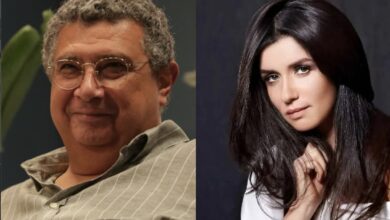There has been much debate in the past week about a film and television series on the life of Muslim Brotherhood (MB) founder Hassan al-Banna, which are in the process of being created by the Kuwaiti production and distribution company Al-Maha. Critics are concerned about the level of involvement of the MB in both the film and the series, which are to be shown during the coming Eid al-Adha season and Ramadan 2012 respectively.
The most obvious sign of the Islamist group's involvement is the contribution of MB leader Mohsen Rady, who is coordinating the two productions, raising fears that the works may turn out to be somewhat biased in their portrayal of Banna. Such fears are compounded by the heavy involvement of members of Banna's family in the production process.
However, at a press conference on Wednesday, Rady sought to reassure journalists that every attempt was being made to ensure both film and television series are true to life, denying claims that the works are aimed at popularizing the MB. A representative of the Kuwaiti production company, meanwhile, dismissed rumors that the MB was providing financial backing for the projects.
This is not the first time Hassan al-Banna's life has been set to the screen. A televised series titled “Al-Gamaa” (The Group) explored the life of Banna in September 2010, with screenwriter Waheed Hamed presenting a narrative on the 83-year-old Muslim Brotherhood. Banna’s family, however, filed lawsuits against Hamed, accusing him of defamation.
As if to redress the perceived imbalance in Hamed's work, the Banna family has taken an active role in the creation of the new works, overseeing their production. Banna's son, Saif al-Islam, will revise the scripts and his daughter, Maha, will attend the shoots.
“I understand that people interpret events differently, but what we’ll be doing is verifying the historical events rather than the interpretations,” explained Saif al-Islam at the press conference.
To ensure impartiality, the scripts will also be revised by public figures, opponents of Banna and some of his students, explained Rady.
“I proposed producing works on the life of Banna in the past, but was asked to get a security clearance first. That’s why we couldn’t make them,” Rady explained, adding that the main objective in featuring the Islamist ideologue is to win him due recognition, not to turn him into a holy person. “Al-Banna is a very rich character; he’s not just a preacher or scholar,” he said.
Al-Maha has produced several biographical television series of key figures in Arab history, including Khaled bin al-Waleed and Antara ibn Shadad. For the 2011 Ramadan season, it is presenting a series on the lives of Prophet Mohamed’s grandsons, al-Hassan and al-Hussein, as well as the first Umayyad caliph, Muawiyah bin Abi Sufyan.
Al-Maha representative Mohamed Onezy defended the role of a Kuwaiti production company in the new venture on the grounds that the significance of some figures such as Banna supersedes the notion of national identity, adding, “We are all one. This is how Arabs should think.”
Onezy was quick to state that Al-Maha is covering all production costs and that the MB isn’t involved in the production process itself.
“Like any company, our first priority is revenue, rather than marketing for different groups or ideologies,” he said.



